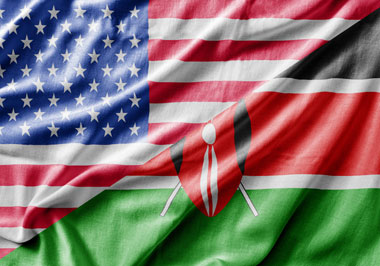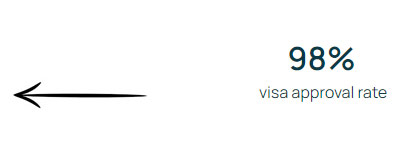Kenya visa requirements for US citizens
US citizens need a visa to travel to Kenya. Find out how to apply, the documents required, the price and processing times for this tourist or business visa.
 Fast: Simplified, efficient process.
Fast: Simplified, efficient process.
 Security: information is protected.
Security: information is protected.
 Reliability: 98% approval rate.
Reliability: 98% approval rate.
 Assistance: 24/7 customer support.
Assistance: 24/7 customer support.


US citizens must follow a well-defined procedure to travel to Kenya, including applying for an e-visa, submitting specific documents, and complying with conditions related to the duration and validity of the visa. Knowing the security requirements, processing times, and renewal or extension options is essential to planning a trouble-free stay. Whether for tourism, business or other reasons, it's important to prepare your trip well to guarantee a successful entry and a pleasant stay in Kenya.
Kenya visa requirements for us citizens
- US citizens need a visa to enter Kenya.
- The visa can be applied for online via the eVisa system.
- The process includes submission of documents, payment of fees and a processing time.
- There are several types of visa, including tourist and business.
- Visas are valid for up to 90 days.


US citizens need a visa to visit Kenya, whether for tourism, business or other reasons. Kenya requires all international travelers from the USA to obtain a visa prior to arrival. Fortunately, the process of obtaining this visa has been simplified thanks to an online application system called eVisa. This electronic procedure allows US citizens to submit their applications remotely, eliminating the need to visit a consulate.
The Kenya visa can be applied for for up to 90 days, which is ideal for tourists wishing to explore the country or business travelers with short-term commitments. It is important to note that travelers must comply with specific requirements concerning the documents to be provided and the payment of associated fees.
Obtaining a visa for Kenya from the USA is relatively straightforward thanks to the eVisa system. The application can be made online on the official Kenyan government website or through a service provider. Here are the steps to follow for a successful application:
In general, applying for a visa online is quick and easy, but it is advisable to submit your application several weeks before departure, as delays may occur.
To submit a visa application for Kenya, US citizens must prepare the following documents:
The cost of a visa for Kenya varies according to the type of visa requested. Prices are generally as follows for US citizens:
It is important to check the exact rates on the official eVisa website, as prices may vary and additional fees may apply depending on the services chosen, such as expedited processing.
Kenya visa processing for US citizens is done online and usually takes between 2 and 7 working days after submission of the application. It is advisable to apply well in advance to avoid any rush. However, in some cases, expedited processing is available for an additional fee.
Processing times may also vary according to the type of visa requested and the time of year. During busy tourist periods, such as vacations or high season, there may be delays. On the other hand, if you need an urgent visa, you can request expedited processing, which can take 1 to 2 working days.
It is also advisable to check your email regularly for any updates regarding your visa application. Once the visa has been approved, you will receive an eVisa by email, which you will need to print out to present on arrival in Kenya.
In summary, although the visa application process for US citizens is relatively quick and straightforward, it is essential to prepare the necessary documents and submit the application well in advance to avoid last-minute complications.
When traveling to Kenya as a US citizen, knowing the duration and validity of your visa is essential for planning your stay. Kenya offers different visa options depending on the purpose of your trip. The type of visa you obtain will determine the length of your stay and entry requirements.
Visas for Kenya can be issued under various categories, including single-entry, multiple-entry and transit visas. The number of times you are authorized to enter Kenya depends on the type of visa you have.
The length of your stay in Kenya also depends on the type of visa you obtain. For US citizens, here's an overview of the different options:
US citizens should also be aware that the length of stay granted by the visa may vary according to the information provided in the application and the particular circumstances of each traveler.
If you wish to extend your stay in Kenya beyond the duration initially granted, you will need to apply for a visa renewal. The renewal procedure can be started at any time before your visa expires. However, it is important to note that the renewal of your visa will depend on Kenyan immigration policies, as well as on your personal circumstances.
If you are refused a renewal, you will have to leave the country and will not be able to return until you have obtained a new visa.
Although Kenya is a very welcoming country for US citizens, it is possible for a visa application to be rejected. There are several reasons why US citizens may be refused a visa:
In the event of refusal, it is possible to appeal, but this can be a long and complex process. It is therefore important to check that all documents are in order before submitting a visa application.
Kenya is a popular country for tourists, including US citizens, thanks to its beautiful scenery, diverse wildlife and historic sites. However, as with any trip abroad, safety is an important consideration. The US government regularly updates travel advice for US citizens visiting foreign countries, including Kenya.
Kenya features popular tourist areas, such as the Masai Mara National Reserve and the beaches of Mombasa, which are generally safe for visitors. However, some parts of the country, particularly those close to the border with Somalia or in the north-east, may be less safe due to political tensions or the risk of violence.
Before leaving, it is advisable to consult the latest travel alerts issued by the U.S. Department of State, and to take precautionary measures, such as :
In general, if you respect the safety recommendations and stay within the well-established tourist areas, your trip to Kenya is likely to be safe and enjoyable.
Find out if your question has been answered in the list below
Kenya does not require a visa on arrival for US citizens. All travelers from the USA must obtain a visa prior to arrival, which can be done easily using the online eVisa system. This online procedure is fast, convenient and saves travelers the hassle of queuing at the airport to obtain a visa. It is important to understand that visa on arrival is not an option for US citizens wishing to enter Kenya. They must submit an online application before their trip. This allows the Kenyan government to better control immigration and ensure that all travelers meet the entry criteria.
Yes, American children also need a visa to enter Kenya, regardless of their age. Visas for children are subject to the same criteria as for adults, and the application must be made online. The process is similar: parents or guardians must complete a visa application form for the child and submit the necessary documents. Documents required for a child include a valid passport, a recent passport photo, and proof of parentage (such as a birth certificate). If the child is traveling alone or with a parent, a travel authorization signed by the other parent or guardian may be required.Children's visas are generally valid for the same period as parents' visas, with a maximum stay of 90 days. Parents or guardians must ensure that the child's documents are in order before traveling.